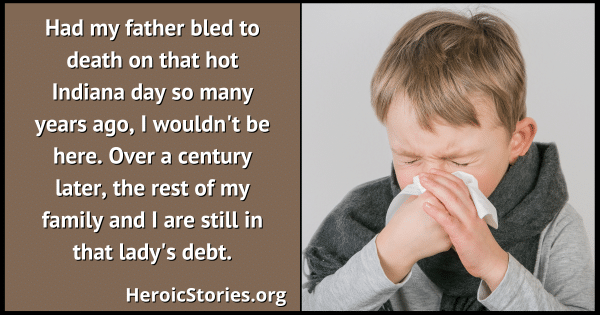Robert B. Albright
Texas, USA

As a small boy growing up in Kokomo, Indiana, my father had polio. In 1898, they didn’t call it that, but from the symptoms my grandmother and he described, that’s what it was. It did not go into the paralytic stages, but still, the effects of polio can be quite bad.
After he recovered somewhat, he was very frail throughout his childhood. In addition, he was prone to horrible nosebleeds.
As boys tend to do, he loved to wander all over the place. In those days, there was a white section and a black section of town; segregation was the norm if not the law. He usually stayed in the white section, as his family expected.
One hot summer day, he was far from home at the edge of the two communities. His nose started to bleed. With his clothes covered with blood, he went to a couple of houses in the white section, seeking help from an adult. They just ran him off.
Eventually, he bled so much he could no longer stand up. Nearby, a group of people was having a family gathering. One of the ladies there saw my father’s plight. Because of the occasion, she was dressed in her finest clothes. My father was covered with blood and dirt, but that didn’t make any difference to her. Here was another human being who needed help and needed it now. She scooped him up and took him back to her family gathering.
In today’s world, ruining her clothes may not seem like much. But in those days, the average family owned two sets of clothes: one for every day and one for dressing up.
She and her relatives worked on my father until the nosebleed stopped. They used their valuable ice on him — ice they wouldn’t have had if not for the party. It was far too expensive in those days.
While rendering first aid, this lady inquired where my father lived. After the bleeding stopped, he was barely conscious. Having interrupted her family party to help him, she took this frail little boy in her arms and began to carry him home.
It was a couple of miles to my father’s house. By now, my grandmother was worried and looking for him. My grandmother met them part way and rushed home with her son in her arms.
The lady who came to my father’s aid was black, and in those days could have gotten into trouble for going into the white neighborhood — not while carrying a white boy home, but on her way back without him.
Had my father bled to death on that hot Indiana day so many years ago, I wouldn’t be here. Over a century later, the rest of my family and I are still in that lady’s debt.
Podcast: Play in new window | Download (Duration: 4:01 — 3.3MB)


Wow! What a window into a different world from today. What a wonderful human being she was. She saw a child in need. The story has been told in the author’s family for a century. I wonder if the same is true in her family. Or if her actions were commonplace for her. Great story!
What a beautiful story. I was fortunate to grow up with absolutely no sense of color difference. I was not even aware that there was a color problem until I went to college in the sixties. I was always taught that people were just people.
What a wonderful, compassionate human being.